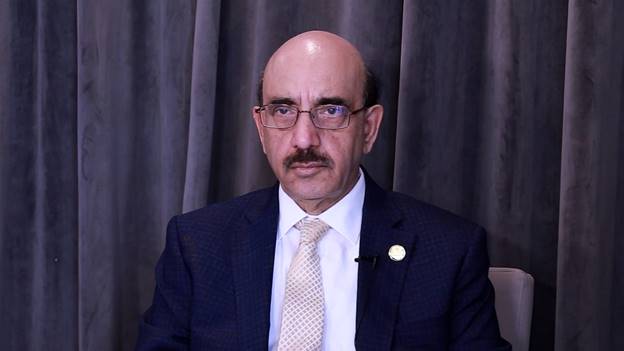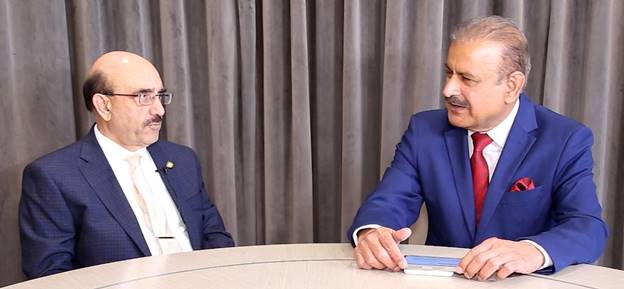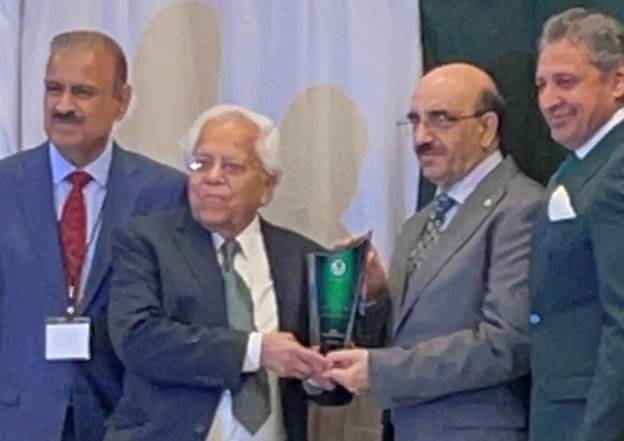
“Pakistan and United States relationship spans many decades. Through these decades, we've had successes. We also had difficult times in this relationship. But our overall assessment is that it has been a productive relationship …” - Ambassador Masood Khan
US Govt, Senators, & Congressmen Recognize Talent of Pakistani Americans: Ambassador Khan
Pakistan Link Report
Los Angeles, CA: During his recent visit to Southern California, Pakistan's Ambassador to the United States, H.E. Masood Khan, engaged in a conversation with Pakistan Link, shedding light on various issues affecting the Pakistani American community. Here are highlights from his insightful discussion with Mr. Arif Zaffar Mansuri, President of PL Publications.
Ambassador Khan brings a rich tapestry of experience to his role in Washington, having navigated intricate diplomatic landscapes from Geneva to New York. His distinguished career includes serving as Pakistan's ambassador to China and as the nation's representative to the United Nations. Prior to assuming his current position in 2022, Ambassador Khan held the esteemed position of President of Azad Jammu and Kashmir.

Ambassador Masood Khan is interviewed by Mr Arif Zaffar Mansuri
Pakistan Link:
Your Excellency, your journey to become the ambassador of Pakistan to the United States is truly remarkable. You've had a long and illustrious career in the foreign service of Pakistan. Before joining the foreign service, you had a diverse career, serving as a lecturer in English, a Pakistan Television host, and a radio newscaster. How do you believe your varied experiences have shaped your approach to diplomacy and your role as an ambassador?
Masood Khan:
First, I want to thank you for having me for this interview. Let me tell you that those days in my early twenties when I was teaching and when I was broadcasting for Pakistan Television or Radio Pakistan were the best period in my life, the golden period. I enjoyed communicating to students and to broader audiences. That gave me confidence and taught me a few things about communication skills, which I carried with me into diplomacy. When I became a junior diplomat, I used those skills. The essence of those skills was how to have a two-way dialogue, how to persuade people, how to manage an interaction, how to manage difficult conversations. I think that these skills helped me as a junior diplomat and also as an ambassador.
Pakistan Link:
I can certainly see how effective these skills would be in your role. Your Excellency, Pakistan's relationship with the United States has been a cornerstone of its foreign policy. The US remains Pakistan's top export market. It is also the major source of foreign direct investment and remittances. What is the current status of the US-Pakistan relationship? Also, what are the most pressing issues affecting and strengthening this relationship?
Masood Khan:
Pakistan and United States relationship spans many decades. Through these decades, we've had successes. We also had difficult times in this relationship. But our overall assessment is that it has been a productive relationship. It has been good for Pakistan. It has been good for the United States. We are building on that foundation now. Both sides are investing in security and non-security realms.
When we talk about security, we're talking about counterterrorism. We are talking about regional stability. Pakistan is a pivotal player for regional stability. That's where we are having continuous dialogue with the US side. Also, we are trying to attract US investment in climate change. For instance, making Pakistan a climate-smart country. Also, education, technology, and energy. Energy, particularly renewables. These are priorities for us. These are also priorities for the United States of America.
We sell the maximum number of goods and services to the United States. As you said, US is the biggest, largest single-country export destination for Pakistani exports. If we produce more, we'll sell more. The United States market is very absorptive for Pakistani products.
Pakistan Link:
Pro-Palestinian protests continue on campuses across the US. How do you perceive this situation? What is your perspective on the current situation in Gaza as well as the Palestinians' struggle for a two-state solution to the raging conflict?
Masood Khan:
As far as the students' demonstrations are concerned, this is for the United States government and the relevant campuses to resolve or to come up with solutions. There's, of course, public sentiment, which is expressed openly about a particular issue. I'd say that in the United States, freedom of expression is sacrosanct. It's one of the tenets of the United States. It's one of the foundational principles of the United States. They have to find a delicate balance.
But when it comes to Palestine, our position is very clear: that there should be an immediate and permanent ceasefire in the Middle East between Palestine and Israel. Second, that humanitarian assistance going to the Palestinians, especially the citizens of Gaza, is being blocked or delayed, so there should be multiple corridors to provide humanitarian assistance to the affected citizens whose neighborhoods have been devastated. The third is that the United States should demonstrate leadership in bringing all the interlocutors to a peace table so that they can come up with the formula for a two-state solution, a formula that satisfies Palestinians, that also recognizes the concept of a Palestinian state, and takes steps towards that goal and that satisfies the other states of the region. This is very important. I think that the solution is self-evident. It has been there on the diplomatic tables for decades. Now is the time to implement it for permanent and durable peace and security in the region.

Ambassador Masood Khan presents an award to Mr Akhtar Mahmud Faruqui, Editor of Pakistan Link, in recognition of his outstanding services at an event hosted by Friends of Pakistan (FOP). Also pictured are FOP Chairman Mr Arif Zaffar Mansuri on the left and FOP President Mr Jamal Khawaja on the right.
Pakistan Link:
At the recent APPNA spring meeting in Chicago, you addressed the gathering of approximately 600 doctors of Pakistani descent, where you suggested the idea of health tourism on Turkey's model. Could you elaborate on this proposal?
Masood Khan:
Yes. Compared to the health facilities in the neighborhood or in Europe, or the United States, and the whole of North America, Pakistan's health services, especially in very sophisticated hospitals, are relatively inexpensive. I think that there's a potential for health tourism there. Turkey has become a model. Some have been going to other parts of the South Asian neighborhood. I mean health tourists. I think that there's a potential for investing in that. In addition to that, I would invite Pakistani physicians to invest in establishing hospitals there where people can go in person for treatment. Also, health tech. Health tech is coming up very fast. It's a growth industry in Pakistan. That, too, I think, would absorb a lot of investment from the Pakistani American physicians. Pharmacy and the entire spectrum of healthcare. I think that through your paper, you also disseminate the opportunities that exist in Pakistan for health tourism.
Pakistan Link:
The World Bank says Pakistan has made progress towards macroeconomic stabilization. Now, with Pakistan seeking another long-term IMF program, what specific measures does the government plan to implement to address the concerns raised by both the IMF and the World Bank?
Masood Khan:
We have three priorities. Recently, the Finance Minister of Pakistan, Mr Muhammad Aurangzeb was in Washington, DC. He had direct talks with the managing director of IMF, Kristalina Georgieva. We also met World Bank President Ajay Banga. They were very hospitable. In fact, they were very supportive of the initiatives that the government of Pakistan had taken to force structural reform and for the implementation of standby arrangement, a $3 billion package, which was agreed last year. They were happy with our implementation process.
Our finance minister conveyed three priorities for Pakistan. These were, of course, first, streamlining our taxation system because we need to bring more sectors into the tax net. I mean untaxed and under-taxed sectors into the tax net. This is one. Second is that we've been investing heavily in the energy sector. Renewables and untargeted subsidies would be withdrawn. The third is that we would privatize non-performing state-owned enterprises. These are the priorities. They've been welcomed and endorsed by the IMF and the World Bank. The World Bank has been a partner in tax reforms. This partnership will continue.
Pakistan Link:
USA-based weekly newspapers Pakistan Link and Urdu Link have been the voice of Pakistani Americans for decades. How do you rate the role of these newspapers in promoting a positive image of the country in the United States?
Masood Khan:
When I used to be in New York and Washington earlier, I was a regular reader of Pakistan Link. It's a good newspaper. It keeps the diaspora community informed about the developments in Pakistan and about their activities here in the United States. It builds a bridge between Pakistan and the United States. It's a good newspaper. I can say the same thing about Urdu Link. Also other papers, I think they serve a purpose. People are away from home. They want to read local news, local here in the United States, in their own language. That's where the ethnic media papers are so important. You also have many social media platforms now in addition to the print media. I think that they do serve a very good purpose.
Pakistan Link:
With the Pakistani diaspora of about 1 million in the United States, what message do you wish to communicate to this vibrant community?
Masood Khan:
I'd say that the journey was long, but now they have made it. Majority of them are very, very prosperous. A majority of them are in the upper middle class, and they're doing well. They've earned a good reputation for them in the United States, in the towns and cities. Their talent is being recognized by the US government, by lawmakers, senators, and congressmen/congresswomen, and assembly members across the United States. This is a new threshold that they have reached. I think that they should consolidate these gains and aim higher to attain excellence in different fields, which they have already, and use their clout to create space for the Pakistani American community and to build bridges between Pakistan and the United States.
Pakistan Link:
Mr Ambassador, I know you have a very hectic schedule to maintain. You are touring Southern California right now. I would like to thank you again for taking the time to sit down with us for an interview. We wish you great success in your visit to Southern California.
Masood Khan:
Thank you. Thank you for giving me this opportunity.
For the full video recording of this captivating interview, please visit www.PakistanLink.com/video/AmbMasoodKhan .

